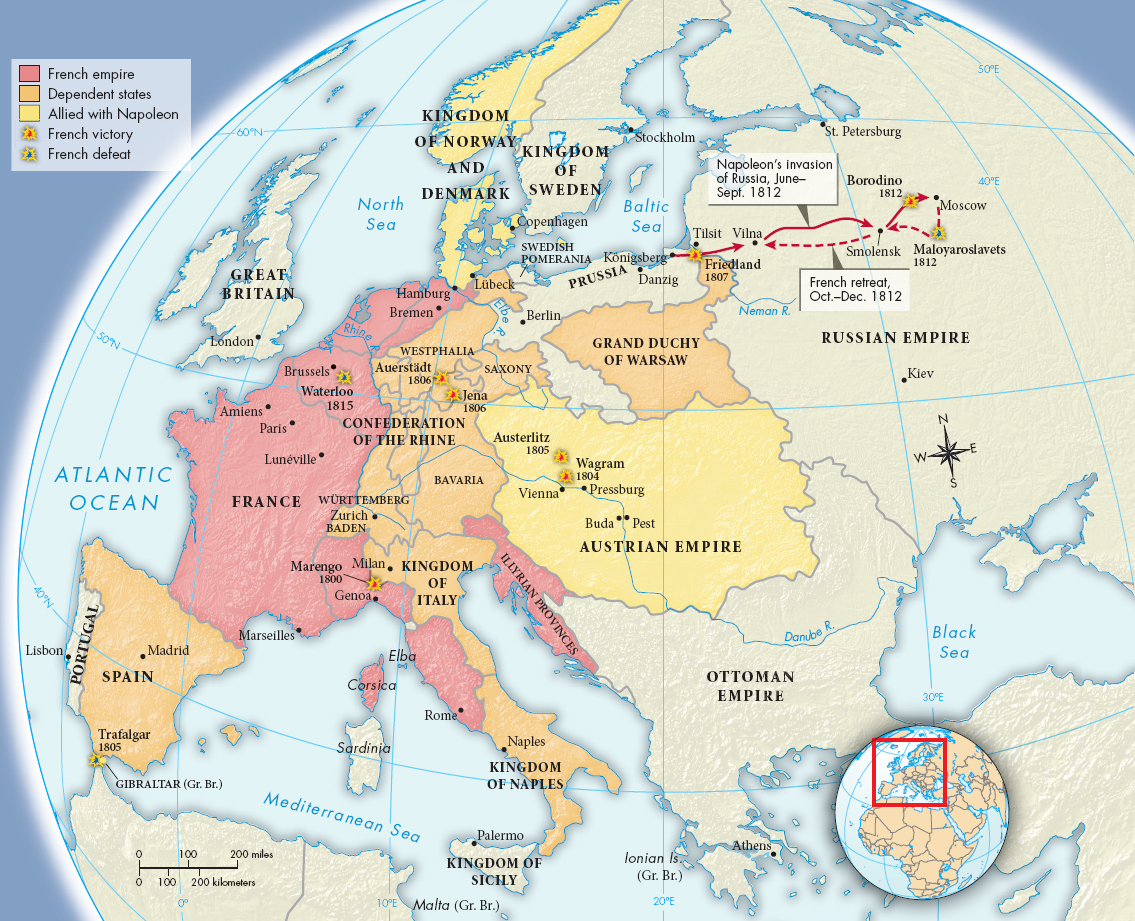Understanding Western Society
Printed Page 599
The Grand Empire and Its End
Napoleon saw himself increasingly as the emperor of Europe, not just of France. The so-
The impact of the Grand Empire on the peoples of Europe was considerable. In the areas incorporated into France and in the satellites (Map 19.2), Napoleon abolished feudal dues and serfdom to the benefit of the peasants and middle class. Yet Napoleon had to put the prosperity and special interests of France first in order to safeguard his power base. Levying heavy taxes in money and men for his armies, he came to be regarded more as a conquering tyrant than as an enlightened liberator.

CONNECTIONS: Why did Napoleon succeed in achieving vast territorial gains where Louis XIV did not?
The first great revolt occurred in Spain. In 1808, a coalition of Catholics, monarchists, and patriots rebelled against Napoleon’s attempts to make Spain a French satellite. French armies occupied Madrid, but the foes of Napoleon fled to the hills and waged uncompromising guerrilla warfare. Spain was a clear warning: resistance to French imperialism was growing.
Yet Napoleon pushed on. In 1810, when the Grand Empire was at its height, Britain still remained at war with France, helping the guerrillas in Spain and Portugal. The Continental System was a failure. Instead of harming Britain, the system provoked the British to set up a counter-
Napoleon’s invasion of Russia began in June 1812. Originally planning to winter in the Russian city of Smolensk, Napoleon recklessly pressed on toward Moscow. The great Battle of Borodino that followed was a draw. Alexander ordered the evacuation of Moscow, which the Russians then burned in part, and he refused to negotiate. Finally, after five weeks in the scorched and abandoned city, Napoleon ordered a retreat, one of the greatest military disasters in history. When the frozen remnants of his army staggered into Poland and Prussia in December, 370,000 men had died and another 200,000 had been taken prisoner.3
Leaving his troops to their fate, Napoleon raced to Paris to raise yet another army. Possibly he might still have saved his throne if he had been willing to accept a France reduced to its historical size. But Napoleon refused. Austria and Prussia deserted Napoleon and joined Russia and Great Britain in the Treaty of Chaumont in March 1814, by which the four powers pledged allegiance to defeat the French emperor.
Less than a month later, on April 4, 1814, a defeated Napoleon abdicated his throne. After this unconditional abdication, the victorious allies granted Napoleon the island of Elba off the coast of Italy as his own tiny state. Napoleon was allowed to keep his imperial title, and France was required to pay him a yearly income of 2 million francs. The allies also agreed to the restoration of the Bourbon dynasty under Louis XVIII (r. 1814–
Napoleon staged a daring escape from Elba in February 1815 and marched on Paris with a small band of followers. French officers and soldiers who had fought so long for their emperor responded to the call. Louis XVIII fled, and once more Napoleon took command. But Napoleon’s gamble was a desperate long shot because the allies were united against him. At the end of a frantic period known as the Hundred Days, they crushed his forces at Waterloo on June 18, 1815. Louis XVIII returned to the throne, and the allies dealt more harshly with the French.
>QUICK REVIEW
How did Napoleon gain and consolidate dictatorial power, and what were the reasons for his downfall?